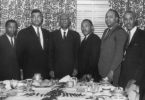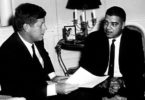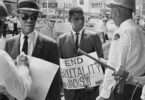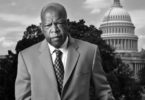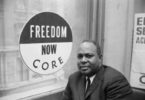Martin Luther King Jr. (1929-1968) was a Baptist minister, social activist, leader of the Civil Rights movement of the 1950s and winner of the 1964 Nobel Peace Prize. His achievements ended prematurely when he was assassinated in 1968.
Luther King was born Michael King Jr. on January 15, 1929 in Atlanta, Georgia. His father was Martin Luther King Sr., pastor of the prestigious Ebenezer Baptist Church in Atlanta, Ga., and his mother was Alberta Williams King, a school teacher. His father adopted the name Martin Luther King Sr. in honor of the German Protestant leader Martin Luther; Michael Jr. also adopted the name.
Education
King attended segregated Booker T. Washington High School, a gifted student, he graduated at 15 and continued his studies at Morehouse College in Atlanta. At Morehouse he met Benjamin E. Mays who played a critical role in his education and was one of the great influences of his life. He challenged King and all his students to struggle against segregation rather than accommodate to it and introduced them to Gandhi’s philosophy or non violence. In 1947 he was ordained at his father’s church and after graduating from Morehouse with a bachelor’s degree in 1948 he entered Crozer Theological Seminary in Pennsylvania where he studied Divinity. In 1951 King graduated from Crozer with honors as class valedictorian and proceeded to earning his Ph.D. of theology at Boston University where he graduated in 1955. In Boston he met his Coretta Scott who was studying voice at the New England Conservatory of Music. King and Scott married in 1954 and moved to Montgomery, Alabama.
Montgomery Bus Boycott
In December 1955 Rosa Parks refused to give her seat to a white passenger in a segregated bus igniting the Montgomery Bus Boycott; the boycott lasted 381 days. King, now a minister at Dexter Baptist Church, was elected president of the Montgomery Improvement Association which organized the boycott. King’s eloquence and leadership drew many followers and the attention of national television. In 1956 the Supreme Court ruled the segregation of buses unconstitutional.
Southern Christian Leadership Congress – SCLC
In 1959 King and his wife moved to Atlanta to head the new SCLC. He became a copastor with his father at the Ebenezer Baptist Church. King encouraged the formation of the Student Non-violent Coordinating Committee to head and organize sit-ins. As leader of SCLC he organized peaceful demonstrations against segregation and mobilized large crowds which were often met with attacks and brutality by police. Police brutality was televised nationally making the country aware of segregation in the South.
Sit-ins, Freedom rides, voter registration drives were only a few of the tactics used to get the government’s attention. The March on Washington D.C. where King delivered his historic address to America “I Have a Dream” opened the doors to new legislative action such as the Civil Rights Act of 1964 and the Voting Act of 1965 which gave African Americans, other minorities and women educational and employment opportunity as well as the right to vote. King was awarded the Nobel Peace Prize in 1964 for his work as a social activist against segregation.
Martin Luther King Jr. was assassinated on April 4, 1968 at the Lorraine Motel in Memphis, Tennessee. He had travelled to Memphis to support a black sanitation workers strike. He was rushed to St. Joseph’s Hospital where he was pronounced dead. His body was originally buried in South-View Cemetery and moved in 1970 to The Martin Luther King Jr. Center for Nonviolent Social Change in Atlanta, Georgia.

